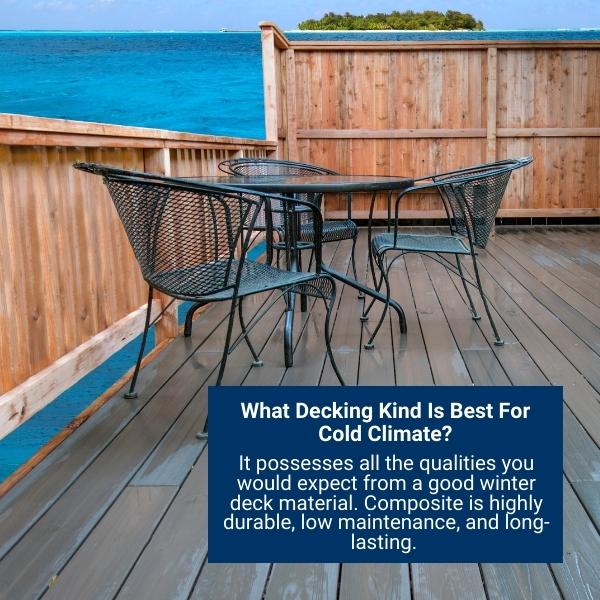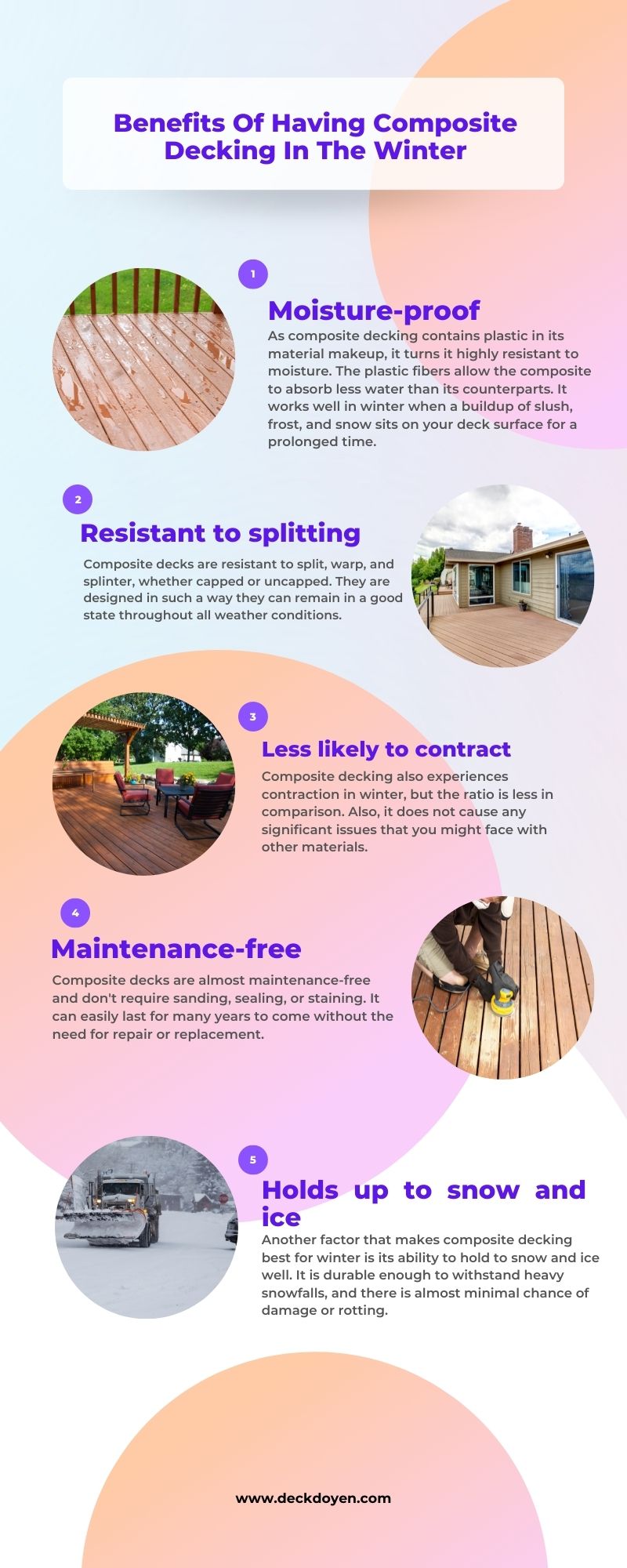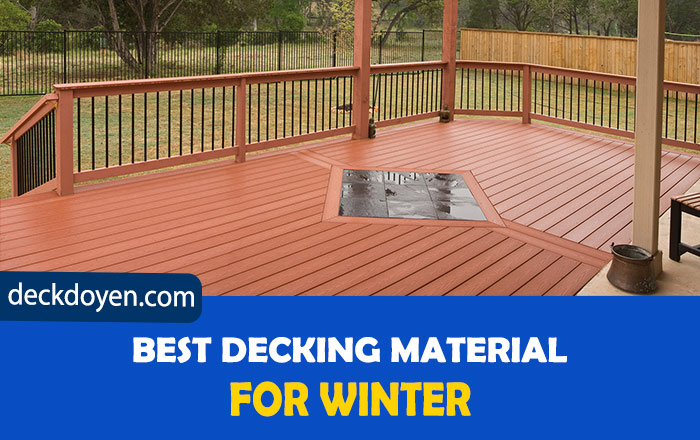When cooler weather arrives, homeowners begin preparing their deck beforehand. It is one way to prolong the deck’s lifespan and save your time, effort, and money. However, it can be hard to keep it well-maintained in the winter period.
Thus, to protect yourself from all this pain, you might be interested to know about the best decking material for winter. Let’s find out!
Composite is by far the best decking material for cold weather. Because it is a combination of both plastic and wood fibers, it is highly durable and long-lasting. Unlike wood, it needs low maintenance and easily overcome heavy snowfalls and freezing temperatures. The composite deck is also resistant to warping and splitting.
Decks have grown in popularity recently as a fun outer living space. But, due to exposure to seasonal weather conditions, your deck can appear shabby and withered. The detailed guide below will help you pick the most reliable option for this winter.
What Decking Kind Is Best For Cold Climate?
The deck is the perfect outdoor relaxation spot that is functional for gatherings throughout spring, summer, and fall. But, when cold weather arrives, your access to the deck gets very limited, and it almost becomes unusable. This issue is even more prominent in areas that experience heavy snowfalls, ice, and freezing temperatures.

If you happen to live in a place with a colder climate, it is crucial to choose the right decking boards. They should be able to survive in extreme temperatures, be resistant to moisture and withstand snowfall and ice. You can find many decking material options like natural wood, composite deck boards, and plastic lumber. But, out of all, composite decks are the best choice for winter.
It possesses all the qualities you would expect from a good winter deck material. Composite is highly durable, low maintenance, and long-lasting. In addition to it, it remains intact during heavy snowfall in winter without getting damaged.
Why Is Composite Decking Better Than Wood For Winter?
It can get very challenging to maintain deck surfaces in the colder months. Factors like freezing temperatures and snow can negatively affect the deck boards. Many people usually prefer wood material for their decks. But, they are more prone to decay and quality loss during the winter. It is a big reason why many people are shifting towards other options for deck installation.

One of the most demanding products in the market other than wood is composite. It is a high-quality product that has undergone enhancements to give the best performance in varying conditions. It does not require as much maintenance as natural wood decks, and you don’t have to worry about constant coatings to keep it long-lasting.
Furthermore, composite material is created mainly from recycled plastic, making it more durable and environmentally friendly. It is also more resistant to slip than wood products, and thus it is safe for walking on snowy days. Composite products also do not split or splinter due to exposure to low-temperature. Wood is more vulnerable to breakage.
Benefits Of Having Composite Decking In The Winter:
Composite decking material offers plenty of benefits that make them the ideal choice for the winter season. Let’s have a brief look at them!

Moisture-Proof:
As composite decking contains plastic in its material makeup, it turns it highly resistant to moisture. The plastic fibers allow the composite to absorb less water than its counterparts. It works well in winter when a buildup of slush, frost, and snow sits on your deck surface for a prolonged time. When you opt for composite decking, you do not have to stress over moisture seeping into the deck boards and causing rot and warping. Once the snow melts, your composite deck will dry very quickly.
Also Read: Deck Armor Vs Tiger Paw: Which One To Use and Where?
Resistant To Splitting:
Composite decks are resistant to split, warp, and splinter, whether capped or uncapped. They are designed in such a way they can remain in a good state throughout all weather conditions. Unlike wooden deck boards, composite materials do not need constant sealing when winter arrives to protect them from breaking and cracking. And, without much effort, your deck is all set and ready for you to use in the upcoming months.
Less Likely To Contract:
Most of the decking material, including wood, tends to expand and contract when exposed to changing temperatures. Composite decking also experiences contraction in winter, but the ratio is less in comparison. Also, it does not cause any significant issues that you might face with other materials. However, it is always better to leave some space in-between the deck boards to give them enough room for swelling or shrinkage.
Maintenance-Free:
Composite decks are almost maintenance-free and don’t require sanding, sealing, or staining. It can easily last for many years to come without the need for repair or replacement. Still, to keep it as good as new, you can remove the buildup of snow, dirt, and debris that usually comes with the winter season. It will help prevent the wet debris from leaving behind any stains.
Also Read: How Can You Build a Deck Without Concrete? Step by Step Guide
Holds Up To Snow And Ice:
Another factor that makes composite decking best for winter is its ability to hold to snow and ice well. It is durable enough to withstand heavy snowfalls, and there is almost minimal chance of damage or rotting. Besides, the composite deck does not turn super slippery due to ice accumulation like other decking materials. It is safe for you to walk and won’t lead to a risky situation. Besides, you can shovel off the snow with ease but make sure not to scratch the surface while clearing it up.
Conclusion:
Nowadays, you have many decking material options. But, for winter, composite decking is the best choice. It surpasses them all in terms of durability, longevity, and resistance to moisture. While many people prefer traditional wood, it is not as safe and long-lasting and can become slippery after a snowfall. Composite decks, on the contrary, requires minimal care and upkeep and perform well in low temperatures.
Also Read: Can You Install Trex Decking In The Winter

